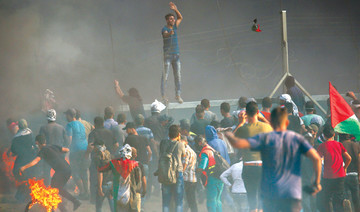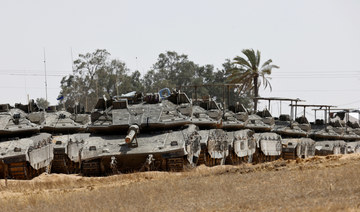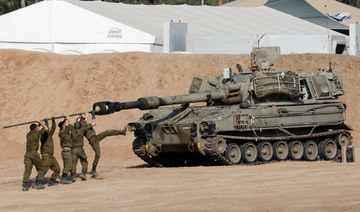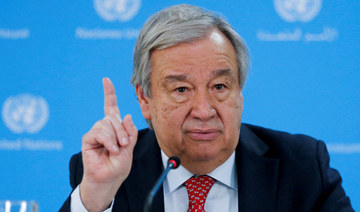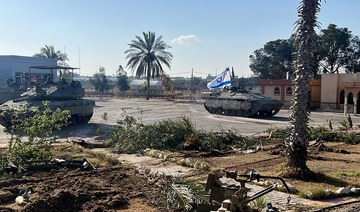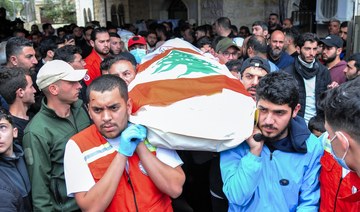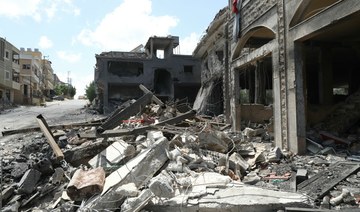JERUSALEM: Israel on Sunday released a French-Palestinian lawyer held without charge for the past 13 months over unspecified allegations, his lawyer said.
Salah Hamouri, 33, was freed at Jerusalem police headquarters after being brought from his cell in a prison in southern Israel’s Negev desert.
Attorney Mahmud Hassan told AFP that Hamouri was forbidden to take part in demonstrations, protests or celebrations of his release for a period of 30 days and required to post a bond of 3,000 shekels ($825, 710 euros).
He was arrested at his home in Israeli-annexed east Jerusalem on August 23, 2017 and subsequently interned under what Israel calls administrative detention, which allows detention without trial for renewable six-month periods.
Neither suspects nor their lawyers are informed of the reasons for arrests and Israel’s Shin Bet domestic intelligence agency had no immediate comment when asked by AFP for the reasons behind Hamouri’s detention.
“Freedom is an indescribable feeling,” Hamouri told AFP after his release, while saying he felt France had not done enough to push for it.
“The detention system in Israeli prisons is often hard. The Israelis try everything to imprison our will, to isolate us from our society and our family.”
He said he had not been in contact with his wife or son during his detention, and that Israel had refused a visa request for his wife who lives in France.
Israeli authorities have in the past accused Hamouri of belonging to the Popular Front for the Liberation of Palestine, which Israel, the United States and the European Union list as a terrorist group.
Hamouri has denied it, according to his wife, contacted in France.
French President Emmanuel Macron and Foreign Minister Jean-Yves Le Drian discussed his case several times with Israeli Prime Minister Benjamin Netanyahu, according to the French foreign ministry.
Israel says administrative detention is intended to allow authorities to hold suspects while continuing to gather evidence, with the aim of preventing attacks or security offenses in the meantime.
But the system has been criticized by Palestinians, human rights groups and members of the international community who say Israel abuses the measure.
Hamouri was born in east Jerusalem to a French mother and a Palestinian father.
Palestinian prisoner support NGO Addameer, which employed him as a field researcher, said he was first arrested and placed under administrative detention in 2001, aged 16.
He was interned without trial for another five-month stretch in 2004, it said, then arrested again in 2005.
Following that arrest, he was tried and convicted by an Israeli court on charges of plotting to assassinate Ovadia Yossef, a prominent Israeli rabbi and spiritual leader of the ultra-Orthodox Shas political party.
Hamouri was released in December 2011 as part of a swap of over 1,000 Palestinian prisoners for Gilad Shalit, a soldier held captive in Gaza for more than five years.
He has always maintained his innocence.
Addameer says more than 5,500 Palestinians are currently held in Israeli jails, including approximately 450 in administrative detention.
Israel frees French-Palestinian after 13 months without trial
Israel frees French-Palestinian after 13 months without trial
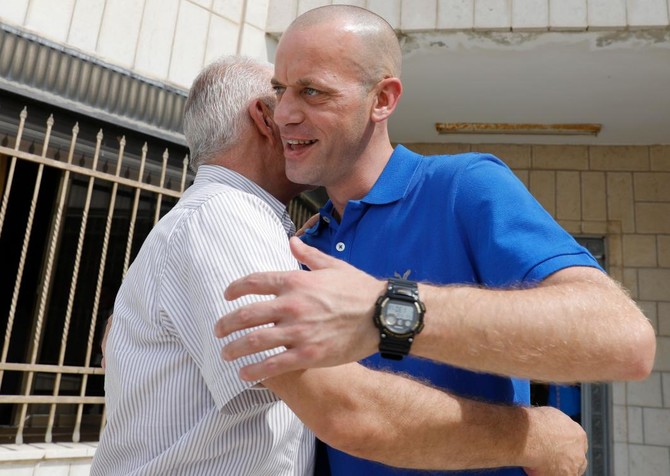
- Salah Hamouri, 33, was freed at Jerusalem police headquarters after being brought from a prison in southern Israel
- He was arrested at his home in Israeli-annexed east Jerusalem on August 23, 2017
Egypt urges all parties to exert more pressure to end Gaza conflict
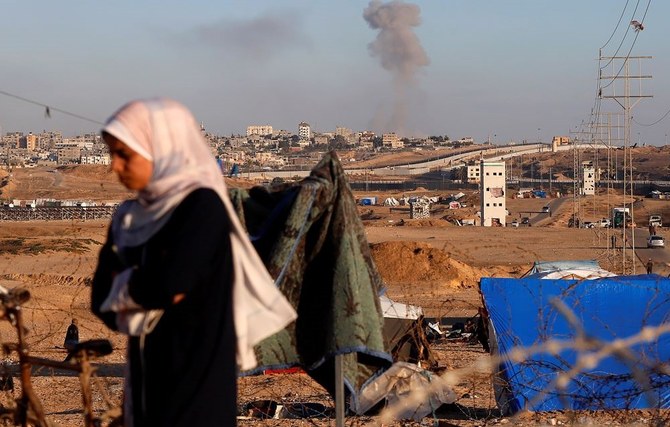
- President Abdel Fattah El-Sisi welcomes progress in recent talks
- Cairo warns Israel that attack on Rafah threatens over 1m in Gaza
CAIRO: Egypt’s President Abdel Fattah El-Sisi has welcomed Monday’s developments in peace talks about finalizing a truce in Israel’s war on Gaza.
El-Sisi said he was “closely following the positive developments pertinent to the ongoing negotiations to reach a comprehensive truce in the Gaza Strip.”
He called on all parties to exert more efforts to reach an agreement that will end the human tragedy of the Palestinian people and finalize the exchange of hostages and prisoners.
Hamas accepted an Egypt-Qatar mediated ceasefire proposal on Monday. The high-stakes diplomatic moves and military brinkmanship left a glimmer of hope alive — but only barely — for an accord that could bring at least a pause in the seven-month-old war that has devastated the Gaza Strip.
An armed conflict between Israel and Hamas-led Palestinian militant groups has been taking place chiefly in and around the Gaza Strip since Oct. 7. It began when Hamas launched a surprise attack on southern Israel from the Gaza Strip, killing around 1,200 people and taking 150 hostages.
Subsequent Israeli strikes against Gaza have driven around 80 percent of the territory’s population of 2.3 million from their homes and caused vast destruction to apartments, hospitals, mosques and schools across several cities.
The Palestinian death toll in Gaza has soared to more than 34,500 people, according to local health officials.
Meanwhile, Egypt’s Foreign Ministry said that it has warned of the dangers of a possible Israeli military operation in Gaza’s Rafah region, “since this escalatory act entails grave humanitarian dangers threatening more than 1 million Palestinians residing in this region.”
It called on Israel to exercise “utmost restraint, and refrain from further escalation at this extremely sensitive timing of ceasefire negotiations, spare the lives of Palestinian civilians who have been enduring an unprecedented humanitarian catastrophe since the outbreak of the war.”
It said that Egypt continues talking with all parties to prevent the situation from deteriorating.
Meanwhile Egypt’s Foreign Minister Sameh Shoukry discussed the Rafah situation with his UAE counterpart Sheikh Abdullah bin Zayed Al-Nahyan in a phone call.
They exchanged views regarding the possibility of Israeli forces carrying out a military operation in the besieged city.
Shoukry reiterated his warning of the dangers of an Israeli military escalation in Rafah, which is considered the last relatively safe area in the Gaza Strip and refuge for more than a million Palestinians.
The ministers stressed the urgency of reaching a truce agreement that allows for the swapping of hostages and detainees, and ensure a permanent ceasefire.
They agreed to continue talks with various parties to prevent the conflict from spreading to the region.
Hezbollah launches ‘explosive-laden drone’ attack on northern Israel
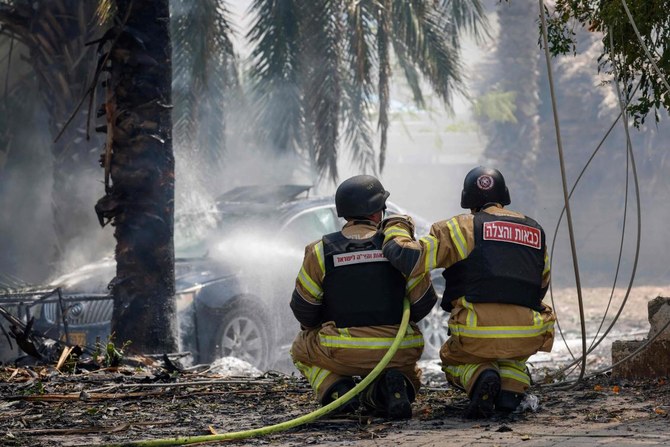
- Hezbollah fighters launched ‘explosive-laden drones targeting enemy soldiers and officers’
- At least 390 people have been killed, in Lebanon, in nearly seven months of cross-border violence
BEIRUT: Lebanon’s Hezbollah said it attacked northern Israel on Tuesday with “explosive-laden drones,” a day after an assault claimed by the Iran-backed movement killed two soldiers there.
Israel and Hezbollah have exchanged regular cross-border fire since Palestinian militant group Hamas’s unprecedented October 7 attack on southern Israel sparked war in the Gaza Strip.
In recent weeks Hezbollah has stepped up its attacks, which it says are in support of Gazans and its ally Hamas, and Israel’s military has struck deeper into Lebanese territory.
Hezbollah fighters on Tuesday launched “explosive-laden drones targeting enemy soldiers and officers,” the group said in a statement.
At the same time, other drones “targeted one of the Iron Dome (air defense system) platforms,” the militants said, adding in separate statements that they carried out other attacks on northern Israel, including with guided missiles.
Israel’s army said on Tuesday that two soldiers had been killed a day earlier in the north.
On Monday, Hezbollah claimed a drone attack on troops near northern Israel’s Metula, with the Israeli military saying “a UAV (drone) was identified crossing from Lebanon” into the area.
In Lebanon, at least 390 people have been killed in nearly seven months of cross-border violence, mostly militants but also more than 70 civilians, according to an AFP tally.
Israel says 13 soldiers and nine civilians have been killed on its side of the border.
Tens of thousands of people have been displaced on both sides.
UN says its access to Gaza’s Rafah crossing ‘denied’ by Israel
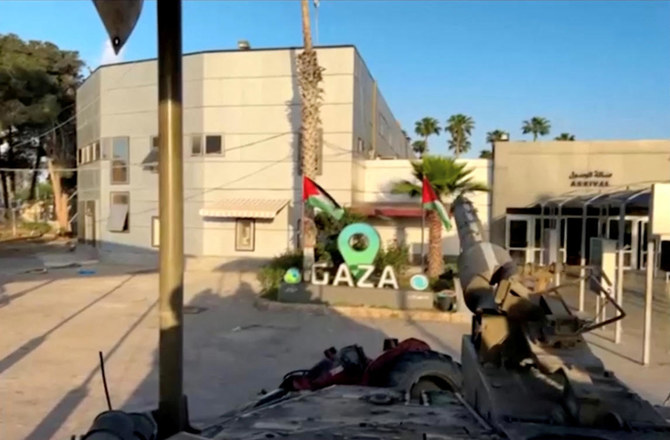
- UN says only has one day of fuel reserves in Gaza
GENEVA: Israeli authorities have denied the UN access to the closed Rafah crossing, the main entry point for humanitarian aid into the Gaza Strip, the United nations said Tuesday .
Jens Laerke, spokesman for the UN’s humanitarian agency OCHA, said there was only a one-day buffer of fuel to run humanitarian operations inside the besieged Palestinian territory.
“We currently do not have any physical presence at the Rafah crossing as our access... has been denied by COGAT,” he said, referring to the Israeli agency that oversees supplies into the Palestinian territories.
“We have been told there will be no crossings of personnel or goods in or out for the time being. That has a massive impact on how much stock do we have.
“There’s a very, very short buffer of one day of fuel available.
“As fuel only comes in through Rafah, the one day buffer is for the entire operation in Gaza.”
If no fuel comes in, “it would be a very effective way of putting the humanitarian operation in its grave,” said Laerke.
“Currently, the two main arteries for getting aid into Gaza are currently choked off,” he said, referring to the Rafah crossing from Egypt and the Kerem Shalom crossing from Israel.
‘Unlike anything we have studied’: Gaza’s destruction in numbers
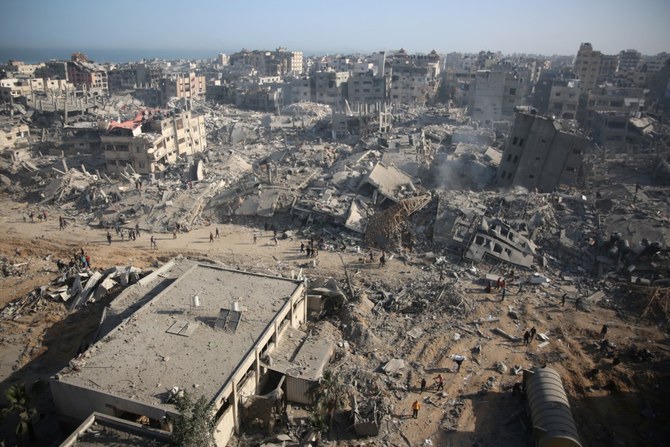
- The level of destruction in northern Gaza has surpassed that of the German city of Dresden, which was firebombed by Allied forces in 1945 in one of the most controversial Allied acts of World War II
Paris: As well as killing more than 34,000 people and causing catastrophic levels of hunger and injury, the seven-month war between Israel and Hamas has also caused massive material destruction in Gaza.
“The rate of damage being registered is unlike anything we have studied before. It is much faster and more extensive than anything we have mapped,” said Corey Scher, a PhD candidate at the City University of New York, who has been researching satellite imagery of Gaza.
As Israel launches an offensive on Rafah, the last population center in Gaza yet to be entered by its ground troops, AFP looks at the territory’s shattered landscape seven months into the war sparked by Hamas’s unprecedented October 7 attack.
Gaza is one of the most densely populated places on the planet, where before the war 2.3 million people had been living on a 365-square-kilometer strip of land.
According to satellite analyzes by Scher and Jamon Van Den Hoek, an associate professor of geography at Oregon State University, 56.9 percent of Gaza buildings were damaged or destroyed as of April 21, totaling 160,000.
“The fastest rates of destruction were in the first two to three months of the bombardment,” Scher told AFP.
In Gaza City, home to some 600,000 people before the war, the situation is dire: almost three-quarters (74.3 percent) of its buildings have been damaged or destroyed.
During the war, Gaza’s hospitals have been repeatedly attacked by Israel, which accuses Hamas of using them for military purposes, a charge the militant group denies.
In the first six weeks of the war sparked by the Hamas attack, which killed more than 1,170 people according to an AFP tally of Israeli official figures, “60 percent of health care facilities... were indicated as damaged or destroyed,” Scher said.
The territory’s largest hospital, Al-Shifa in Gaza City, was targeted in two offensives by the Israeli army, the first in November, the second in March.
The World Health Organization said the second operation reduced the hospital to an “empty shell” strewn with human remains.
Five hospitals have been completely destroyed, according to figures compiled by AFP from the OpenStreetMap project, the Hamas health ministry and the United Nations Satellite Center (UNOSAT). Fewer than one in three hospitals — 28 percent — are partially functioning, according to the UN.
The territory’s largely UN-run schools, where many civilians have sought refuge from the fighting, have also paid a heavy price.
As of April 25, UNICEF counted 408 schools damaged, representing at least 72.5 percent of its count of 563 facilities.
Of those, 53 school buildings have been completely destroyed and 274 others have been damaged by direct fire.
The UN estimates that two-thirds of the schools will need total or major reconstruction to be functional again.
Regarding places of worship, combined data from UNOSAT and OpenStreetMap show 61.5 percent of mosques have been damaged or destroyed.
The level of destruction in northern Gaza has surpassed that of the German city of Dresden, which was firebombed by Allied forces in 1945 in one of the most controversial Allied acts of World War II.
According to a US military study from 1954, quoted by the Financial Times, the bombing campaign at the end of World War II damaged 59 percent of Dresden’s buildings.
In late April, the head of the UN mine clearance program in the Palestinian territories, Mungo Birch, said there was more rubble to clear in Gaza than in Ukraine, which was invaded by Russia more than two years ago.
The UN estimated that as of the start of May, the post-war reconstruction of Gaza would cost between 30 billion and 40 billion dollars.
HRW: Israel attack on Lebanon rescuers was ‘unlawful’
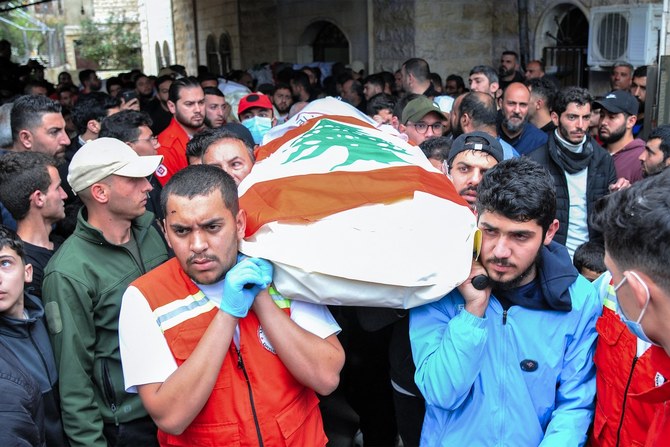
- The rights group urged the United States to “immediately suspend arms sales and military assistance to Israel
Beirut: Human Rights Watch said Tuesday an Israeli strike in Lebanon that killed seven first responders was “an unlawful attack on civilians,” and urged Washington to suspend weapons sales to Israel.
The Israel-Lebanon border area has witnessed near-daily exchanges between the Israeli army and Hamas ally Hezbollah since the Palestinian militant group attacked southern Israel on October 7 sparking war in Gaza.
“An Israeli strike on an emergency and relief center” in the southern village of Habariyeh on March 27 “killed seven emergency and relief volunteers” and constituted an “unlawful attack on civilians that failed to take all necessary precautions,” HRW said in a statement.
“If the attack on civilians was carried out intentionally or recklessly, it should be investigated as an apparent war crime,” it added.
The Israeli military did not immediately comment when contacted by AFP.
But at the time the military said the target was “a military compound” and that the strike killed a “significant terrorist operative” from Jamaa Islamiya, a Lebanese group close to Hamas, and other “terrorists.”
HRW said in the statement that it found “no evidence of a military target at the site,” and said the Israeli strike “targeted a residential structure that housed the Emergency and Relief Corps of the Lebanese Succour Association, a non-governmental humanitarian organization.”
Jamaa Islamiya later denied it was connected to the emergency responders, and the association told AFP it had no affiliation with any Lebanese political organization.
HRW said “the Israeli military’s admission” it had targeted the center in Habariyeh indicated a “failure to take all feasible precautions to verify that the target was military and avoid loss of civilian life... making the strike unlawful.”
The rights group said those killed were volunteers, adding that 18-year-old twin brothers were among the dead.
“Family members... the Lebanese Succour Association, and the civil defense all said that the seven men were civilians and not affiliated with any armed group,” it added.
However, it noted that social media content suggested at least two of those killed “may have been supporters” of Jamaa Islamiya.
HRW said images of weapons parts found at the site included the remains of an Israeli bomb and remnants of a “guidance kit produced by the US-based Boeing Company.”
“Israeli forces used a US weapon to conduct a strike that killed seven civilian relief workers in Lebanon who were merely doing their jobs,” HRW’s Lebanon researcher, Ramzi Kaiss, said.
The rights group urged the United States to “immediately suspend arms sales and military assistance to Israel given evidence that the Israeli military is using US weapons unlawfully.”


